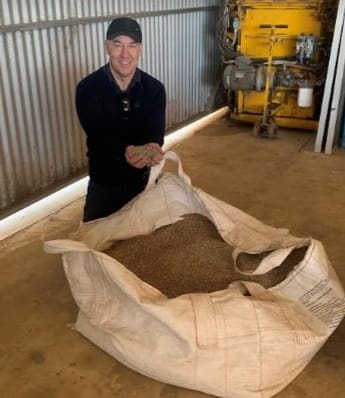
DPIRD research scientist Dr Kevin Foster is leading a new FutureSheep project to build more resilient, sustainable and profitable businesses for the future.
WESTERN Australian sheep enterprises will get get help to build resilience and sustainability in the face of climate change through a new three-year project.
The FutureSheep project is part of the SheepLinks program, a partnership between the Department of Primary Industries and Regional Development (DPIRD) and Meat and Livestock Australia (MLA).
The project will assess the impact of projected climate scenarios for 2030 and 2050 on the productivity of key WA sheep producing regions, including Bruce Rock, Kojonup and Wagin.
Existing data shows the south-west of WA is becoming drier and hotter and future projections indicate the trend will continue – presenting challenges for pasture and animal production.
DPIRD research scientist Kevin Foster told the recent WA Livestock Research Council study tour the modelling would assist producers to understand the impact of a changing climate on production and markets to future-proof businesses.
“The modelling will provide an insight into what the industry will look like in 2030 and 2050 and what tools, systems and strategies are required to remain profitable.
“The project will look at adaption options, spanning feed base alternatives, animal management and genetics, as well as business models,” Dr Foster said.
“This includes examining pasture and shrub species adapted to hot and dry conditions, alongside revising sheep management strategies like joining time and breeding objectives related to heat tolerance and feed conversion.
“Alternative production models, including enterprise balance, conservation grazing, carbon farming and business diversification, will also be assessed to provide sheep producers with a range of options that could fit their operation.”
The Future Sheep project will be guided by a reference group, comprised of scientists, producers and consultants, to harness the knowledge, expertise and opportunities across industry, while ensuring the relevance of outcomes.
The project will create synergies with the eastern states industry, while drawing from the partners’ FEED365 project, based at DPIRD’s Katanning Research Station.
MLA Group Manager for Productivity and Animal Wellbeing, David Beatty, described the project as an important extension of MLA’s broader NEXUS project.
“We will be using data from the Feed365 project to inform potential forage options, while methodology will be informed by the NEXUS project,” Dr Beatty said.
“This input will be integrated into the modelling for the FutureSheep project to provide climate projections for 2050 and identify suitable feed base options, which will guide ongoing research, development and extension activities.”
The collaboration will also ensure the outcomes are relevant ‘on the ground’ by partnering with the six grower group farms involved in the FEED365 project.
“WA sheep producers are adept at responding to a variable climate and will continue to undertake their own research and development onfarm,” Dr Beatty said.
“This visionary project takes a multi-disciplinary approach to providing producers with the knowledge to make the longer term decisions about how to best adapt to the future climate challenges to remain internationally competitive.”
Sheep producers interested in participating in the FutureSheep reference group are encouraged to email [email protected] or telephone +61 (0)8 9368 3795.
For more information about this and other SheepLinks projects visit www.agric.wa.gov.au/sheeplinks.
Source: DPIRD.

HAVE YOUR SAY